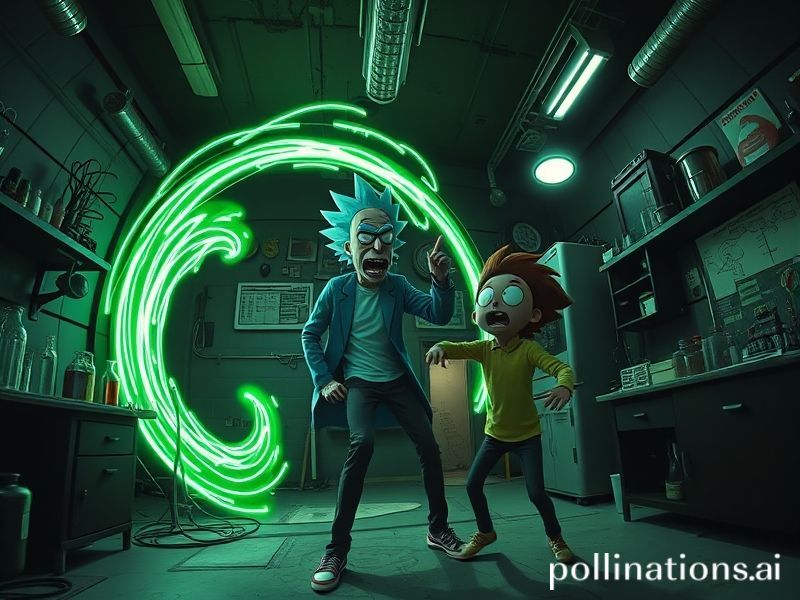Rick and Morty: How a Belching Cartoon Scientist Became the Global Anthem for Existential Dread
Rick and Morty: A Multiverse Passport for the Global Existential Crisis
By Dave’s Locker International Desk
Somewhere between a Syrian refugee camp Wi-Fi hotspot and a Seoul subway car hurtling toward Gangnam, two silhouettes—one spiky-haired teen, one belching scientist—have become the planet’s most unlikely cultural ambassadors. Rick and Morty, the animated brainchild of Justin Roiland and Dan Harmon, now beams into 171 territories via Netflix, HBO Max, and whatever unregulated IPTV box your cousin in Bogotá bought at the flea market. In effect, the show has done what the United Nations only dreams of: convinced rival superpowers to binge the same nihilistic bedtime story and laugh at the same fart joke in 38 different languages, including Arabic, Russian, and—thanks to a particularly dedicated Icelandic fan sub—“existential dread with subtitles.”
The numbers are almost as absurd as the plotlines. Season six’s premiere drew 2.5 million Chinese viewers on Bilibili before censors noticed that Rick literally vaporizes a fascist version of himself and hit the panic button. Meanwhile, in Argentina, bootleg merch stalls outside La Bombonera stadium hawk portal-gun keychains next to Messi jerseys, as if scientific omnipotence and left-footed genius were interchangeable national treasures. The European Union’s Audiovisual Observatory reports that Rick and Morty is the most illegally downloaded Western cartoon in the Balkans, edging out Peppa Pig, presumably because swearing at your grandfather in Serbian feels more cathartic than oinking.
But the show’s global reach isn’t merely a triumph of marketing; it’s a Rorschach test for late-stage capitalism. In India’s tech hubs, junior coders binge episodes during 3 a.m. stand-ups, seeing in Rick’s contempt for bureaucracy a heroic refusal to file Jira tickets. German philosophy majors cite season two’s “unity of infinite Ricks” as a contemporary gloss on Heidegger’s Dasein—because nothing says “Being and Time” like a sociopathic grandpa weaponizing pickles. Even the Vatican’s unofficial film club—yes, it exists—has reportedly debated whether the multiverse absolves God or merely outsources sin to alternate timelines where Hitler became a landscape artist. The conclusion? “Complicated,” followed by a long sip of Chianti.
Darker still, Rick and Morty provides a convenient lingua franca for geopolitical despair. Ukrainian soldiers on trench duty swap theories about Evil Morty between drone alerts; their Russian counterparts allegedly do the same on Telegram channels, suggesting that existential dread is the last neutral territory left. In Tehran, a black-market dub replaces every mention of “federal government” with “ayatollah oversight,” inadvertently making the show both more subversive and more coherent. Saudi Arabia’s MBC censored the alcoholic burps, which only made Rick look like a man tragically allergic to his own brilliance—arguably an upgrade.
The merchandising hydra is equally transnational. Vietnamese sweatshops crank out Plumbus plushies that Western influencers unbox for ad revenue, completing a supply chain that starts with underpaid labor and ends with a YouTuber in Finland screaming, “It’s squishy!” Each plushie ships with a carbon footprint the size of a small moon, proving that capitalism can monetize even the critique of capitalism, provided there’s enough comic sans on the packaging.
And yet, for all its cynical sheen, the show offers something governments can’t: a shared punchline at the abyss. When COP28 delegates in Dubai sneak off to watch Rick turn himself into a sentient planet that literally eats plastic, they’re not procrastinating—they’re commiserating. Climate catastrophe, authoritarian creep, AI overlords: every apocalypse du jour is already canon, animated in 4K and served with a side of Szechuan sauce that McDonald’s keeps pretending is discontinued. The sauce, like the despair, always resurfaces.
So here we are, a planet of eight billion anxious primates, collectively soothed by the notion that somewhere in the multiverse there’s a version of Earth where we got it right—then immediately bored by how boring that sounds. Rick and Morty’s true global export isn’t humor; it’s permission to admit that the cosmic joke is on us, and we’re still the punchline. Tune in, drop out, and try not to think about the Chinese censors cutting to black just as Rick says, “Wubba lubba dub dub”—roughly translated, “I am in great pain.” We all are, buddy. Pass the remote.







